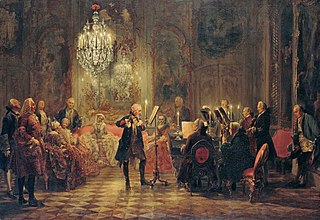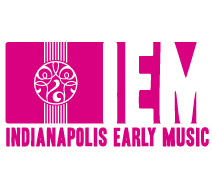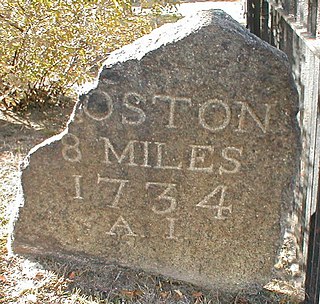John Holloway is a British baroque violinist and conductor, currently based in Dresden, Germany. John Holloway is a pioneer of the early music movement.

Akademie für Alte Musik Berlin is a German chamber orchestra founded in East Berlin in 1982. Each year Akamus gives circa 100 concerts, ranging from small chamber works to large-scale symphonic pieces in Europe's musical centers as well as on tours in Asia, North America and South America.
Andreas Staier is a German pianist and harpsichordist.
Crawford Young is an American lutenist and musicologist residing in Basel, Switzerland.
Robert Mealy is a performer and teacher of baroque violin. He holds a joint position at the Yale School of Music and the Department of Music of Yale University, where he directs the Yale Collegium Musicum and teaches classes in musical rhetoric and historically-informed performance. He has recorded over 50 CDs of early music, ranging from Hildegard of Bingen with Sequentia, to Renaissance consorts with the Boston Camerata, to Rameau operas with Les Arts Florissants. At home in New York, he is a frequent leader and soloist with the New York Collegium, Early Music New York, the Clarion Music Society, and the ARTEK early music ensemble.
Lorenzo Ghielmi is an Italian organist and harpsichordist.
Leonard Hokanson was an American pianist who achieved prominence in Europe as a soloist and chamber musician. Born in Vinalhaven, Maine, he attended Clark University in Worcester, Massachusetts and Bennington College in Vermont, where he received a master of arts degree with a major in music. He made his concert debut with the Philadelphia Orchestra at the age of eighteen. Drafted into the U.S. Army after graduate school, he was posted to Augsburg, Germany. He achieved early recognition as a performer in Europe, serving as a soloist with such orchestras as the Berlin Philharmonic, the Rotterdam Philharmonic, and the Vienna Symphony. He was awarded the Steinway Prize of Boston and was a prizewinner at the Busoni International Piano Competition in Bolzano, Italy. His numerous international music festival appearances included Aldeburgh, Berlin, Echternach, Lucerne, Prague, Ravinia, Salzburg, Schleswig-Holstein, Tanglewood, and Vienna.
Schola Cantorum is a chamber choir from Norway. The choir was founded by composer and conductor Knut Nystedt in 1964, and has given valuable musical experience to generations of Norwegian musicians. Affiliated with the University of Oslo, Department of Musicology, the choir recruits most of their singers from this institution, as well as the Norwegian Academy of Music.

Early music festivals is a generic term for musical festivals focused on music before Beethoven, or including historically informed performance of later works. The increase in the number of music festivals specializing in early music is a reflection of the early music revival of the 1970s and 1980s. Many larger festivals such as that an Aix-en-Provence Festival also include early music sections, as do, inevitably, festivals of sacred music; such as the Festival de Música Sacra do Baixo Alentejo, in Portugal. Although most early music festivals are centered on commercial performance, many include also workshops. This articles includes an incomplete list of early music festivals, which may overlap with topics such as list of Bach festivals, list of maritime music festivals, list of opera festivals, and in some cases list of folk festivals.
Ludger Rémy was a German harpsichordist, conductor and musicologist.
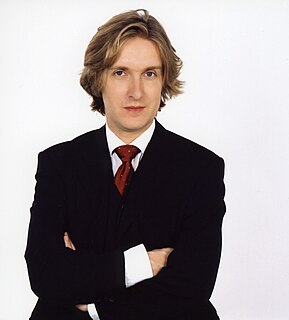
Jan Kobow is a German classical tenor in concert, Lied, and Baroque opera.
Elisabeth Scholl is a German soprano and academic teacher.
Schola Cantorum of Oxford is the longest running chamber choir of University of Oxford, and one of the longest established and most widely known chamber choirs in the United Kingdom. The conductor is Steven Grahl.
Marek Štryncl is a Czech conductor, violoncellist, choirmaster, and composer, who was born in 1974 in Jablonec nad Nisou. He is the founder and leader of Baroque music ensemble Musica Florea.
Clytus Gottwald is a German composer, conductor and musicologist, focused on chorale music. He is known for his arrangements for a vocal ensemble of up to 16 voices.
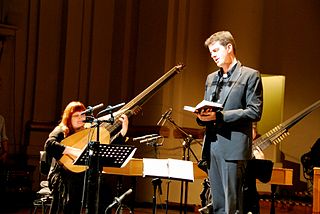
Christina Pluhar is an Austrian theorbist, harpist, and director of L'Arpeggiata ensemble.
Profeti della Quinta is a male vocal ensemble, specializing in the music of the Renaissance and Baroque periods. Founded in the Galilee region of Israel by Elam Rotem, the ensemble is currently based in Basel, Switzerland, where its members undertook advanced studies at the Schola Cantorum Basiliensis. The core of the ensemble includes countertenor, tenor and bass singers, who perform either a-cappella or together with period instruments such as theorbo and harpsichord.

Susanne Ingegerd Rydén is a Swedish soprano who has been called "Sweden's most renowned singer". She specializes in early music and has performed across Europe and abroad.

Imke David is a German viol player, author, Professor and Ensemble-Member.

Christopher Holman is an American organist and musicologist best known for his research about historic pipe organs and liturgy. His areas of specialty include French classical organ alternatim performance practice, renaissance keyboard music from Switzerland, Austria, and Germany, and the organ works and continuo practice in the music of Johann Sebastian Bach. He is Editor of the organ journal Vox Humana. Since 2017, he has been a research fellow at the Schola Cantorum Basiliensis thanks to a grant from the Frank Huntington Beebe Fund, and in October 2019, he will begin doctoral study at the University of Oxford.
